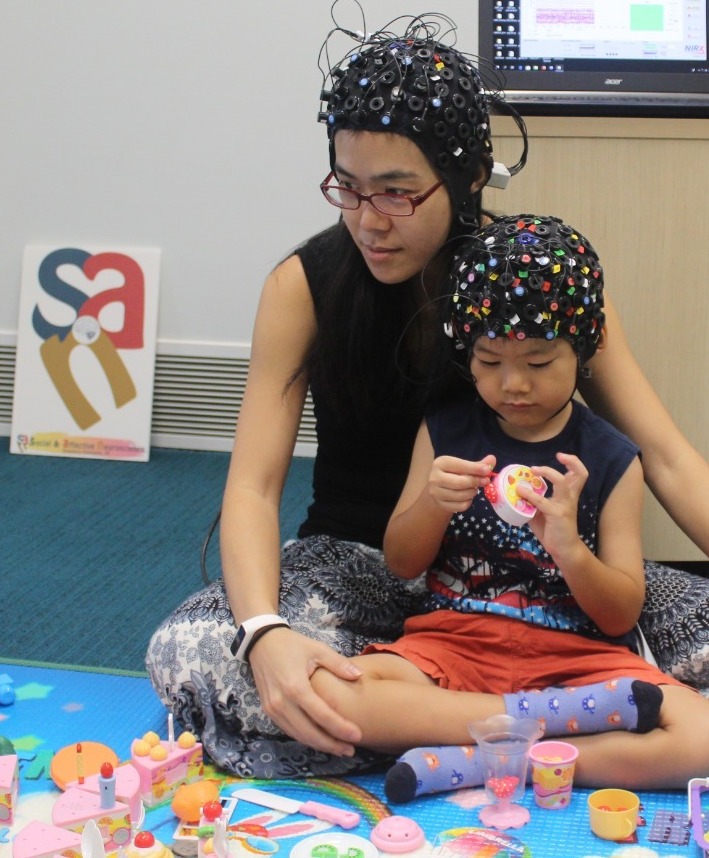Becoming a parent is simultaneously a life-changing and tremendous responsibility, and it is no wonder that many parents end up feeling overwhelmed by the prospect of nurturing a young life. Parenting is a demanding process, and could elicit stress from parents should these demands prove too much for them to cope. This is especially true of mothers, who are more often the primary caregivers of their children.
In today’s world of social media posts with achievements and stylized shots of parents with their children at developmental milestones (#firstwords, #firststeps, and #proudmum), parents can feel increasingly inadequate and ill-prepared for their role as caregivers when comparing themselves to their online peers. Parenting stress is now more relevant than ever as young parents scramble to make sure that they are not ‘falling behind’.
However, using functional near-infrared spectroscopy (fNIRS) to measure relative levels of oxygen in specific areas of the brain in our recent study, we have shown that too much parenting stress lowers how ‘in sync’ the mother’s and child’s brains are.
By measuring the patterns of activation and deactivation in the brains of mothers and their children while they are simultaneously engaged in the viewing of emotionally salient animation videos, we have found that mothers who report higher parenting stress experience lower synchrony with their child. These videos, ranging from Brave, Peppa Pig and The Incredibles, were specially chosen to reflect child-friendly content that many households and parents choose themselves to watch together with their children in their day-to-day activities.

This pattern of synchrony is found in areas of the brain significantly associated with Theory of Mind processes, specifically in the medial left cluster of the prefrontal cortex. Theory of Mind processes are implicated in interpersonal skills such as empathy and inferring the mental states of other individuals. In other words, higher parenting stress may disrupt the ability of mothers to attune to the emotional cues of their child. Additionally, decreased synchrony between mother and child has been previously shown to affect the development of Theory of Mind within the child, especially during the ages of three to four when Theory of Mind begins to develop. Our study raises the possibility of bi-directional influences between the mother’s and child’s abilities to attune to each other.
On an intuitive level, cultivating a healthy parent-child relationship is one of the top priorities for all parents worldwide, and sharing moments on an emotional level is one of the easiest ways to build rapport between the parent and the child. Furthermore, multiple studies around the world have highlighted the importance of such a relationship on a psychological and developmental level, as children who enjoy healthy relationships with their mother are more likely to develop adaptive emotional regulation and stress-coping strategies that endure till adulthood.
In order to be able to build a meaningful relationship with the child, the parent must be able to be emotionally present and attentive. To this end, stressing too much about whether or not one is doing a good job of parenting their child is not helpful, as it takes away from being fully present.
It’s okay if you’re not the perfect parent. Take a break from comparing yourself to other parents, breathe, and enjoy the present moment with your child. You may be surprised at how much better you can attune to each other.
Gianluca Esposito, PhD
Nanyang Assistant Professor, Nanyang Technological University, Singapore
Associate Professor, University of Trento, Italy
Atiqah Azhari
Nanyang Technological University, Singapore
Azhari, A., Leck, W. Q., Gabrieli, G., Bizzego, A., Rigo, P., Setoh, P., Bornstein M. H. & Esposito, G. (2019). Parenting Stress Undermines Mother-Child Brain-to-Brain Synchrony: A Hyperscanning Study. Scientific reports, 9(1), 1-9. DOI: 10.1038/s41598-019-47810-4
Follow us here and subscribe here for all the latest news on how you can keep Thriving.
Stay up to date or catch-up on all our podcasts with Arianna Huffington here.

